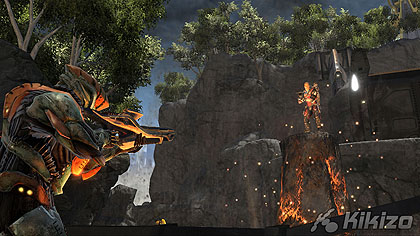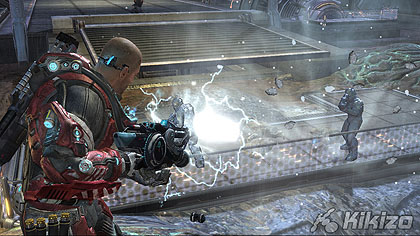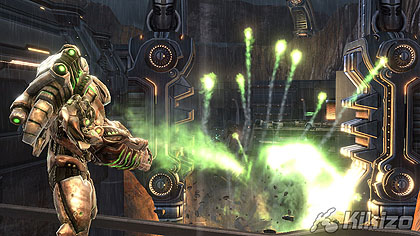Fracture Hands-On & LucasArts Interview
Does LucasArts' new game break new ground - or its promises? We met with the company's Jeffrey Gullett to chat about the project and get some hands-on.
Page: 1 2
Page 2
Adding to the CPU stress is the overall game structure, which has flat open spaces with defined targets but lacking the demarcated paths to reach them. Instead, players are given a toolbox of abilities that they can use however they choose to reach their goals, a trait of Fracture the team is eager to get across. But the desires of the developers have to match the expectations of players, who could easily become overwhelmed by so much choice.
"We want to keep it open to people can play the way they really want but at the same time we want them to experiment with this new mechanic that we've put in," he says. "That's been kind of a challenge. We don't want to beat the player up and make the game so difficult that they die if they don't use it but we definitely want to challenge them to make them think that the full-on run-and-gun assault isn't going to be of use here."
Tempering the newness of the gameplay is a fairly straightforward story, set 150 years in the future but that resonates with themes that will be familiar to anyone that keeps at least an eye on the headlines. The game is based in the US, with San Francisco already being touted as one of the main locales. We're promised a world that, while clearly not our own, is similar enough that attentive players will be able to pick out landmarks, such as the iconic San Francisco-Oakland Bay Bridge. On this backdrop of familiarity will play out a story of us-versus-them, as warring factions who variously favour genetic or cybernetic enhancements battle it out.
At the centre of all this is lead character Jet Brody, a space-marine-esque member of the Atlantic Alliance and enemy to the genetically modified Pacificans. Brody has gone through a lot of change during the course of development, including an overhaul from the game's previous leading man, Mason Briggs. Why the change? According to LucasArts, there were several reasons for giving the game a new lead, including responses from those given an early look at the project and comments from George Lucas himself.
Speaking to the team, it's obvious that there's a lot of respect for the man whose names appears in the company title. Lucas may have been repeatedly passed over by the Academy, but there are legions of science-fiction fans who would follow him to the ends of the Earth. "You can't downplay the value of comments from George Lucas," says Gullett. "All you've got to do is look at his history and you've got to know he knows what he's talking about. We definitely put a lot of value into any comments he gives us."
Commentary is particularly useful in the case of Fracture because it's a new property - something that has intrinsic risk in a day of seven-figure development budgets. Like many other studios, LucasArts has opted for an approach that allows players to recognize familiar gameplay and story ideas, easing them into the experience.
"This has definitely been more challenging," adds Gullett, "but one of the things that's working out well for us is how we're using sort of familiar concepts and locations, so it automatically touches people with things they're familiar with. We're using environmental disasters, which ties directly with things that you hear on the news today, same with the genetic modification. So it's not an entirely unfamiliar world right from get go, but we've taken it to extremes."
Naturally, the hope is that the game will be successful enough that the concept can be extended into a sequel, and Gullett says he would "love to see where this storyline can go".
Something that was not given too much attention on the day but that is definitely going to be included in the final package is online multiplayer. Day 1 was one of the first studios to attempt online play on the Xbox and the team is looking to bring that expertise to this toolbox of novel weapons and accessories. Gullett says that multiplayer is "something that right from the beginning [Day 1] knew that they wanted to devote a lot of time and effort to."
What will distinguish Fracture from other online shooters is that the central gameplay elements are seamlessly brought over from the singleplayer portion of the game. What the team is promising is a game that will never play the same way twice, because there are no levels, in the traditional sense, to learn. Players will always be able to deform the terrain, allowing each play session to be subtly different from the previous one. "Each time you die and respawn it's almost like you're in a new level every time you come back into the game."
The ideas are promising but once the controller is in your hand, Fracture comes off as slightly gimmicky. This is very much a game built around a central idea and my limited time with the demo didn't leave me convinced that the idea is all that interesting. I also got the impression that the actual shooting has been overlooked while the team works on the terrain deformation. By all accounts Fracture is essentially in the can and so will not be harmed by the recent downsizing at LucasArts. Will the game be able to win over an audience that's been treated to a wealth of high-quality shooters over the last six months? The incoming demo and eventual release later this year will tell.
Fracture is released October 7/10 in the US/UK.
Page: 1 2








 Satoru Iwata Video Interview - the late Nintendo president spoke with Kikizo in 2004 as 'Nintendo Revolution' loomed.
Satoru Iwata Video Interview - the late Nintendo president spoke with Kikizo in 2004 as 'Nintendo Revolution' loomed. Kaz Hirai Video Interview - the first of Kikizo's interviews with the man who went on to become global head of Sony.
Kaz Hirai Video Interview - the first of Kikizo's interviews with the man who went on to become global head of Sony. Ed Fries Video Interview - one of Xbox's founders discusses an epic journey from Excel to Xbox.
Ed Fries Video Interview - one of Xbox's founders discusses an epic journey from Excel to Xbox. Yu Suzuki, the Kikizo Interview - we spend time with one of gaming's most revered creators.
Yu Suzuki, the Kikizo Interview - we spend time with one of gaming's most revered creators. Tetris - The Making of an Icon: Alexey Pajitnov and Henk Rogers reveal the fascinating story behind Tetris
Tetris - The Making of an Icon: Alexey Pajitnov and Henk Rogers reveal the fascinating story behind Tetris Rare founders, Chris and Tim Stamper - their only interview? Genuinely 'rare' sit down with founders of the legendary studio.
Rare founders, Chris and Tim Stamper - their only interview? Genuinely 'rare' sit down with founders of the legendary studio. The History of First-Person Shooters - a retrospective, from Maze War to Modern Warfare
The History of First-Person Shooters - a retrospective, from Maze War to Modern Warfare